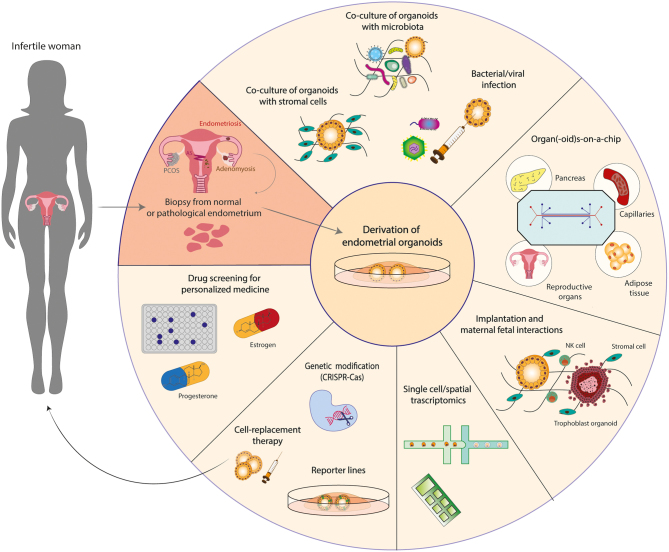Figure 3.
Applications of endometrial organoids in infertility. Organoids can be derived from biopsies of normal or pathological endometrium (endometriosis or carcinoma). Organoids from women suffering from other uterine disorders such as Asherman’s syndrome (AS), adenomyosis or other disorders that affect the endometrium indirectly, like polycystic ovary syndrome (PCOS), are yet to be established. The organoids consist of epithelial cells but isolation of stromal cells from the same biopsies will allow the creation of complex co-culture systems that combine both cell types facilitating the study of decidualization. Exposure of the organoids to commensal or pathogenic microorganisms (viruses, bacteria) will reveal how infection affects epithelial integrity and fertility. Implementation of bioengineering technologies for the combination of organoids from reproductive organs (ovaries, endometrium) and other organs/tissues- (pancreas, adipose tissue, capillaries) on-a-chip will lead to the creation of more dynamic in vitro models. Endometrial organoids could be co-cultured with trophoblast organoids derived from the first-trimester placentas, to study the signals that mediate the interaction between the fetus and the mother. Addition of uterine natural killer (NK) cells will help elucidate how maternal immune cells affect trophoblast proliferation and differentiation and shed light into obstetric disorders that arise due to placentation failure. Another application of endometrial organoids is their use in single cell and spatial transcriptomic technologies for the identification and localization of progenitor cells. Potentially identified markers of progenitor cells could then be used to genetically edit organoids to create reporter lines and monitor their expression in different conditions. In the future, organoids could provide an alternative therapy for the replacement of scarred endometrium in women with AS. Women suffering from endometriosis could also benefit from replacement of the progesterone-resistant endometrium with organoids, genetically manipulated to express progesterone receptors and thus respond to progesterone. Translational applications of the endometrial organoids include drug testing; testing the dosage and response to oestrogen and progesterone to offer tailored hormonal treatment for women prior to in vitro fertilization (IVF).

 This work is licensed under a
This work is licensed under a 